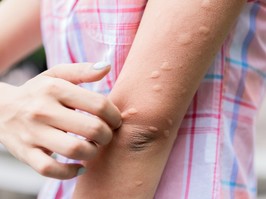salty dog paws: ice melters may keep you upright, but they can be toxic to animals
street salt and de-icers contain toxic chemicals that can cause mouth and stomach issues in animals, and in severe cases, seizures, and even death.

while they do a good job of giving humans some traction under foot in icy conditions, ice melters can be an irritant to sensitive dog paws, and even cause a chemical burn. getty
some people don’t consider winter to have officially arrived in canada until the first snowfall. some go by the date of the winter solstice. for others, winter starts the moment halloween ends, and holiday decorations go up.for me, it doesn’t really feel like winter until i see my dog, mugsy, dancing across a sidewalk full of salt and ice melter like he’s walking on hot coals.mugsy is a dog tailor-made for winter. he loves to play in the snow, loves getting dried off with a towel even more and seems impervious to the cold. but this dog is no match for a couple handfuls of salt scattered on concrete.he’s not alone, either. most canadian sidewalks and roads in winter are a battlefield of limping dogs.but what is about street salt that hurts so much?well, it turns out those ice melting products could be causing a chemical burn on your pup’s feet.the most common ice melters are usually either rock salt (sodium chloride), a combination of salt and sand or other forms of salt with different chemical compounds such as calcium chloride, magnesium chloride, sodium acetate, potassium chloride, urea, or a blend of these products.while they do a good job of giving humans some traction under foot in icy conditions, ice melters can be an irritant to sensitive dog paws, and even cause a chemical burn. the sharp edges of rock salt can always be extremely uncomfortable for doggos to walk on — hence the limping and hopping.exposure to the salt or other compounds, along with cold dry air, can leave paws cracked, dry, itchy and peeling. the sensitive pads can even turn a whiteish colour if they aren’t wiped down properly after walks.these ice melting products can also hurt pets in other ways beyond causing discomfort in their paws. and it has to do with one of the first things your dog does to their paws after returning home from a cold or salty walk: lick them.those de-icers are then ingested, which can be toxic to dogs or cause harmful mouth and stomach issues. salt poisoning is a possibility if a large quantity is ingested — causing vomiting, diarrhea or seizures, coma and even death in severe cases.luckily, there are plenty of ways to help your pet avoid the worst when it comes to salty dog paws. leave out a pan of warm water before you head out for your walk so you can dunk the paws and wipe them down once you return. alternatively, use a wet towel to wipe those paws down before your pup gets at them.to avoid the dry, itchy, cracking paws, i use a little bit of paw balm before and after wintery walks to protect the pads of mugsy’s feet. it’s like a little lip chap for the pads, keeping them moisturized.i’ve also gotten into the habit of using little balloon-like booties on mugsy’s feet if i know it’s particularly icy or salty outside. at first you can tell he’s wondering, “what the heck are these things on my feet?” as he high-steps around the house (treats and praise go a long way on those days). but the rubber protects his feet from the salt, and i can reuse them a few times before they rip.some people prefer to buy their dogs proper boots with zippers or straps to protect their pup. they tend to be more expensive (and i haven’t seen a pair big enough for mugs yet), but they’re more durable and long-lasting than the little rubber ones. some even have tread on the bottom to prevent slipping.if possible, it’s best to avoid salty roads and sidewalks on your walk to reduce exposure to the salty chemicals. for your own property, consider buying a pet-friendly ice melter product that won’t be toxic if ingested.be sure to check out your local pet store for different products for proper paw care, and consult with your vet if you notice any unusual cracking, bleeding or extreme discomfort on your dog’s paws.
nick beare is a toronto-based freelance writer. he can be reached here.
don’t miss a thing: sign-up for healthing’s newsletter
thank you for your support. if you liked this story, please send it to a friend. every share counts.
 3 minute read
3 minute read





